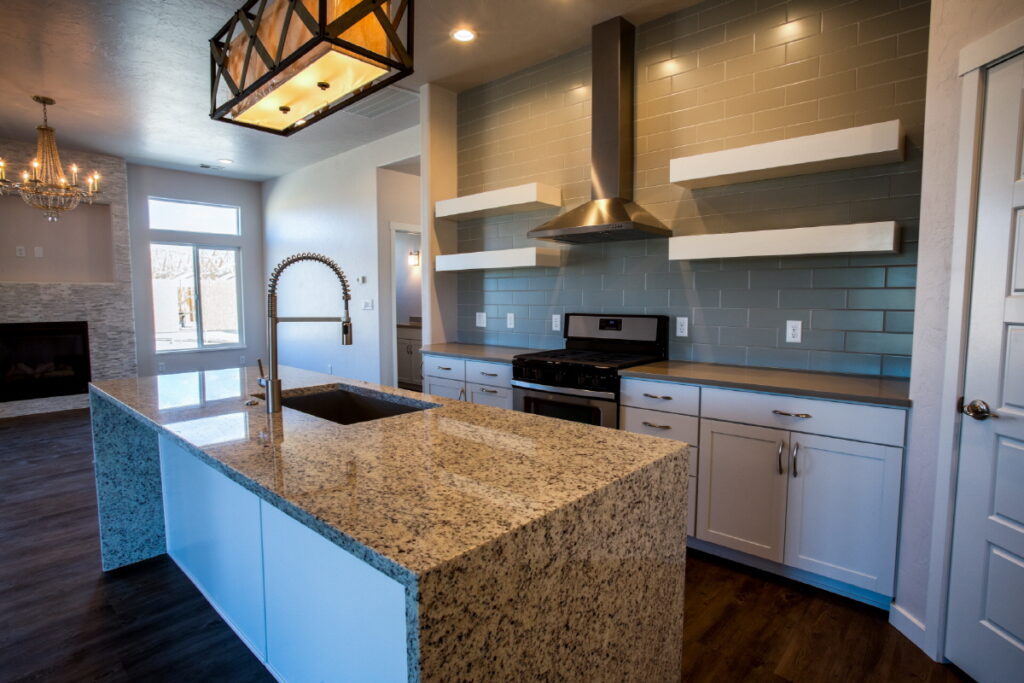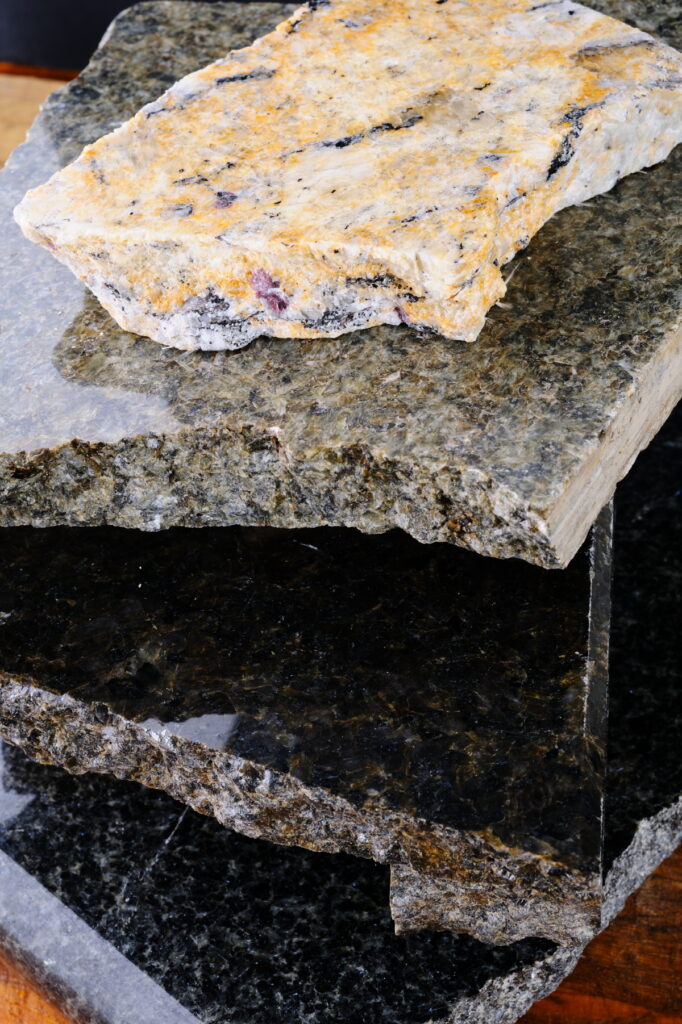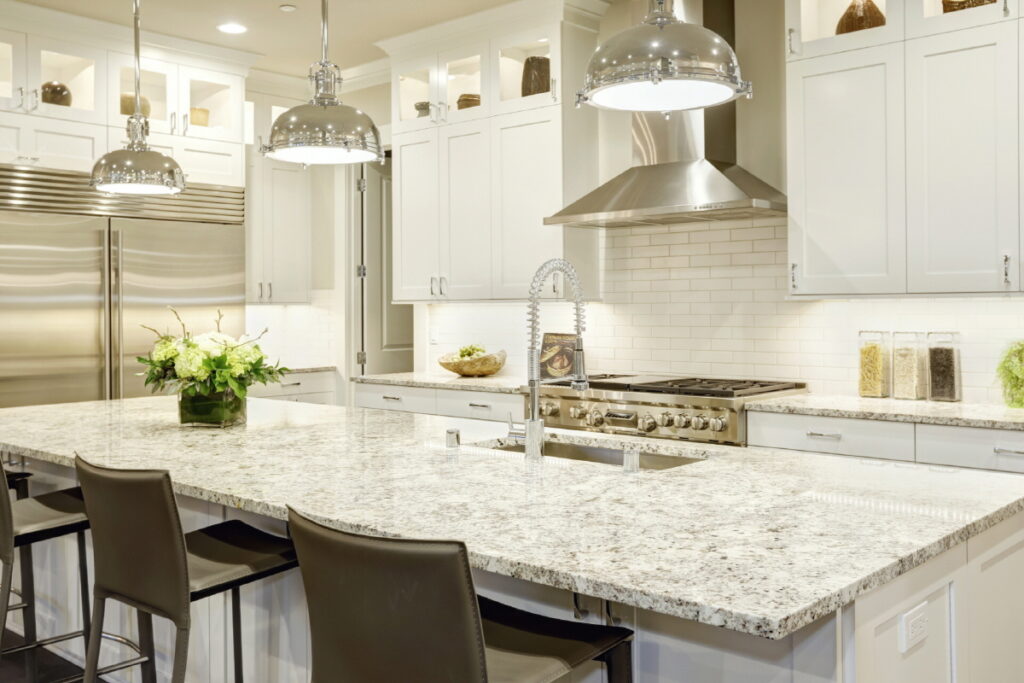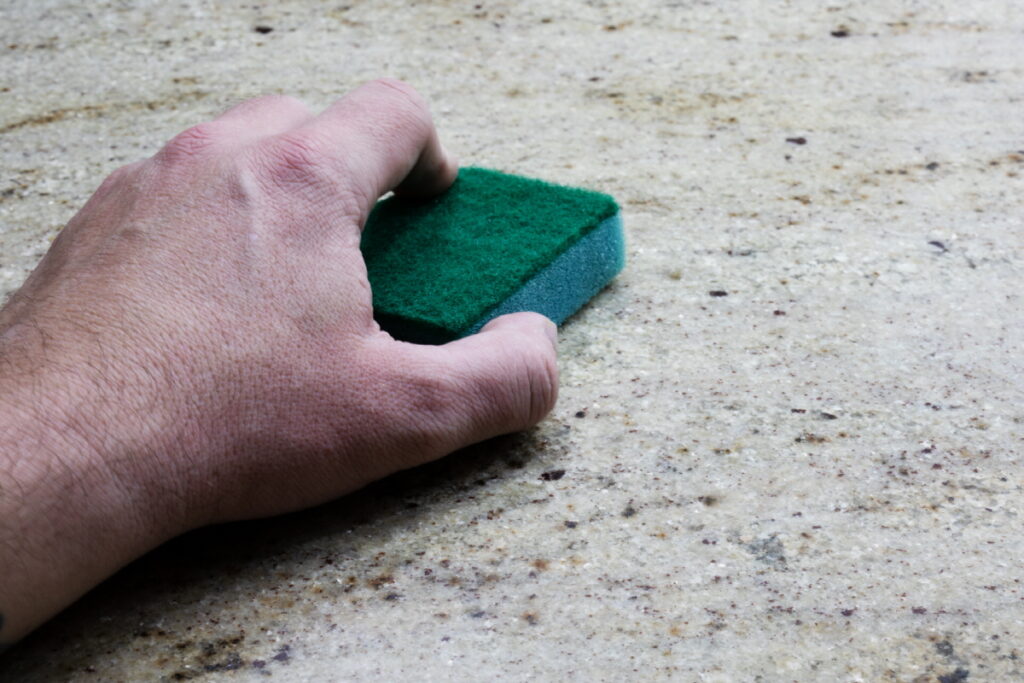
Since the 1990s, granite countertops have been one of the most popular countertop materials. You couldn’t turn on a home improvement show for many years without seeing a granite countertop upgrade, especially in the kitchen. When designing a dream kitchen, most homeowners and designers wanted granite — many still do. However, in 2022, quartz is now considered the most popular countertop material. What happened? Why has granite fallen in favor, and is it still a good choice for your kitchen? Let’s closely examine the pros and cons of granite countertops for your kitchen and whether it’s still a good choice.
What is Granite?

Granite provides a natural organic beauty to homes because it’s a natural resource, a form of coarse-grained igneous rock composed chiefly of quartz and feldspar with minor amounts of mica, amphiboles, and other interlocking minerals. It comes in a range of colors with visible grains and flecks present. Granite forms due to a slow crystallization of magma below the Earth’s surface. It can take millions of years to produce granite; however, granite is also one of the most abundant stones on Earth, making up about 80% of the world’s surface.
To create countertops, granite is mined from underground, cut into thin slabs, and polished and fabricated into various sizes for installation. Granite is extremely strong, and its natural beauty and strength make it an excellent option for traditional homes and designs that can afford to add the luxury and durability of natural stone to their project.
Durability of Granite Countertops
Granite countertops resist chipping, scratching, and cracking. The hard, durable surface won’t scratch even when using your sharpest chef knives. However, you won’t want to cut directly on a granite countertop as the surface can quickly dull your knives.
Granite can withstand the daily activities in your kitchen, whether that’s meal prep, homework, arts and crafts, or other family projects. Granite is easy to clean and doesn’t require special solvents or cleaning solutions to maintain its appearance. However, granite countertops require regular sealing to prevent stains from penetrating the surface and water or bacteria from seeping into pores. Depending on your granite countertop and sealant, you may need to seal your counters as frequently as once a year to be sure your granite countertop performs to its highest standards.
Granite Countertop Appearance

The appearance of granite countertops is a major plus for some and a significant drawback for others. Some will love the fact that no two granite countertops are unique, and each slab of granite is different from the next, making it an excellent option for those who value a unique aesthetic all their own. However, some may find granite countertops somewhat dated due to their longstanding popularity.
While granite comes in many colors, including white, gray, black and neutrals, the design choices are limited to what you can find in nature. The veining and specks featured in many granite slabs may not work with sleek, modern designs. It can also be more challenging to choose a countertop design that looks like its sample, since each slab has its unique appearance.
Still, granite is a good way to go if you prefer the luxury of natural stone and like having an earth-quarried countertop. With so much granite available across the globe, you can find many colors and styles. Its natural appeal and million-years-in-the-making beauty make granite a solid choice for many designers and homeowners.
Heat Resistant of Granite Countertops
If you’re the type of person who needs to remember to put down a hot pad or trivet before placing a hot pan or pot on the countertop, we have some good news. Granite is heat resistant, so it’s a fantastic material to put near ranges and cooktops. You don’t have to worry if you occasionally place a hot item on a granite countertop. Granite won’t discolor or scorch from a hot pot, pan, or heated appliance.
As a natural stone, granite can withstand temperatures up to 1,650 degrees Fahrenheit, with a melting point of about 2,300 degrees Fahrenheit, all within the typical kitchen cooking range. Thermal shock is unlikely to happen to your granite kitchen countertops as most cooks will not come close to reaching granite’s temperature threshold.
However, while an occasional hot pan won’t get you into trouble, you should avoid placing hot items directly on your granite countertops. While the granite can take the heat, the sealants that protect it from stains, moisture, and bacteria are not as heat resistant and may discolor or scorch with continuous exposure to high temperatures. If you do see damage or discoloration, it’s probably in the sealant, and a professional fabricator may be able to repair the damage.
Precautions of Granite Countertops

The main disadvantage of granite countertops is the required maintenance. Depending on the quality of the granite and the sealant, you may have to reseal granite countertops annually. Granite is porous and will stain from vegetable and fruit juices, wine, and other food and beverages. The material’s porous nature also means that moisture and bacteria may collect in the pores and create additional problems. If your granite countertops are properly sealed, however, there should be no reason not to use granite in your home.
Granite countertops can also be one of the more expensive countertop materials. The average American homeowner typically spends around $3,000 to replace granite in an average kitchen. You can pay anywhere from $100 per square foot to $450 per square foot for many sophisticated styles and colors. While you can find granite countertops on sale or at a reduced cost, they may be in a different color or pattern than you desire. For many, the neutral-colored and heavily speckled granite countertops that were so popular in the 1990s and 2000s, may look out of date given other more modern materials.
Is Granite a Good Choice for Kitchen Countertops?
With relatively few drawbacks and extraordinary durability, granite countertops will be popular for many years to come, especially for those looking for a unique design and the beauty of natural stone. While granite may have lost some headway to the more popular quartz option, you still can’t go wrong with using granite in your kitchen, especially if you don’t mind some routine maintenance and can afford to use natural stone.
Alternatives to Granite Countertops

If you’re looking for countertops with a modern appeal and virtually no maintenance, you may want to consider quartz instead of granite. Quartz countertops, often called engineered stone, combine the strength and durability of granite with less maintenance in a nonporous material that’s hygienically superior to granite.
Many quartz countertops offer the look of natural stone with greater performance. If you’re trying to decide between granite and the new kitchen countertop leader — quartz, check out the many design options available from VIATERA quartz, LX Hausys’s high-quality granite alternative. VIATERA quartz uses only the finest quartz with up to 93% natural quartz, one of the hardest and most abundant minerals on Earth, in every slab. VIATERA’s nonporous quartz surfaces are strong, hygienic, and easy to clean and maintain. Check out all the collections, styles, and colors on the VIATERA site.
Contact Us
If you’re planning a kitchen design, let’s talk. We’re happy to help you with any of your countertop material needs. Simply visit our site, fill out a form, and one of our experts will reply to you quickly at the email you provide. Visit our site to contact a countertop professional and start making your dream kitchen a reality.